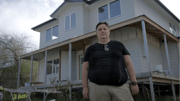Family of Aussie man exposes shocking price of tragic Fiji holiday
When we think of Fiji, we often imagine pristine beaches, crystal-clear waters, and a paradise escape from the hustle and bustle of everyday life.
However, for one Victorian family, a dream holiday turned into a harrowing ordeal that has not only captured the attention of the island nation's politicians but also highlighted the stark reality of unexpected misfortune abroad.
Clayton Brett, an Altona man, found himself in a life-or-death battle after a mysterious attack while vacationing in Fiji.
The incident left him with a stab wound so severe that he was placed in an induced coma and suffered from septic shock.
The nightmare unfolded when Mr Brett failed to return home to Melbourne, prompting his family to frantically call hospitals in Fiji, only to discover the gravity of his condition.
The family's ordeal underscores the importance of being prepared for any eventuality when travelling overseas.
Terry Brett, Clayton's father, expressed the family's distress, saying, 'The worry was for us that if we didn’t get him home then, we possibly wouldn’t get him home.'
The urgency to transport Clayton back to Australia for life-saving treatment led to the arrangement of a Medevac flight to Melbourne, a decision that came with a staggering price tag of over $140,000.
But the financial burden didn't stop there. The hospital fees for Clayton's treatment in Fiji amounted to $80,000, a sum that would be daunting for any family to face.
Terry Brett's words serve as a sobering reminder to all travellers: 'Any person that goes overseas and doesn’t have travel insurance is silly.'
Travel insurance can often seem like an unnecessary expense, but as the Bretts' experience shows, it can be the difference between a manageable situation and a financial catastrophe.
The incident has also sparked political discourse in Fiji, with MP Rinesh Sharma citing the attack as an example of the rising crime rates linked to economic challenges and cost-of-living increases.
‘While we urge the Fiji Police Force to increase their presence in towns, cities and communities… we urge every Fijian to take caution in public spaces and secure their premises,’ he stated.
In an effort to support Clayton's recovery, his stepbrother Matthew Davis initiated a GoFundMe campaign, which has raised over $28,000 to date.
The description on the GoFundMe page read:
The funds are intended to alleviate the financial strain on Clayton's parents, who have been steadfast by his side throughout this ordeal.
As Clayton's story continues to unfold, it serves as a stark reminder of the unpredictable nature of life and the importance of being prepared for the unexpected.
For our readers, particularly those in their golden years who may be planning trips abroad, let this be a cautionary tale.
Ensure that you have comprehensive travel insurance, familiarise yourself with the healthcare facilities of your destination, and always have a contingency plan.
You can watch the interview with Mr Brett here:
Source: 7NEWS Australia/YouTube
 We invite you to share your thoughts and experiences with travel insurance and overseas medical emergencies. Have you or someone you know faced similar challenges while on holiday? How did travel insurance—or the lack thereof—impact the situation? Let us know in the comments below!
We invite you to share your thoughts and experiences with travel insurance and overseas medical emergencies. Have you or someone you know faced similar challenges while on holiday? How did travel insurance—or the lack thereof—impact the situation? Let us know in the comments below!
However, for one Victorian family, a dream holiday turned into a harrowing ordeal that has not only captured the attention of the island nation's politicians but also highlighted the stark reality of unexpected misfortune abroad.
Clayton Brett, an Altona man, found himself in a life-or-death battle after a mysterious attack while vacationing in Fiji.
The incident left him with a stab wound so severe that he was placed in an induced coma and suffered from septic shock.
The nightmare unfolded when Mr Brett failed to return home to Melbourne, prompting his family to frantically call hospitals in Fiji, only to discover the gravity of his condition.
The family's ordeal underscores the importance of being prepared for any eventuality when travelling overseas.
Terry Brett, Clayton's father, expressed the family's distress, saying, 'The worry was for us that if we didn’t get him home then, we possibly wouldn’t get him home.'
The urgency to transport Clayton back to Australia for life-saving treatment led to the arrangement of a Medevac flight to Melbourne, a decision that came with a staggering price tag of over $140,000.
But the financial burden didn't stop there. The hospital fees for Clayton's treatment in Fiji amounted to $80,000, a sum that would be daunting for any family to face.
Terry Brett's words serve as a sobering reminder to all travellers: 'Any person that goes overseas and doesn’t have travel insurance is silly.'
Travel insurance can often seem like an unnecessary expense, but as the Bretts' experience shows, it can be the difference between a manageable situation and a financial catastrophe.
The incident has also sparked political discourse in Fiji, with MP Rinesh Sharma citing the attack as an example of the rising crime rates linked to economic challenges and cost-of-living increases.
‘While we urge the Fiji Police Force to increase their presence in towns, cities and communities… we urge every Fijian to take caution in public spaces and secure their premises,’ he stated.
In an effort to support Clayton's recovery, his stepbrother Matthew Davis initiated a GoFundMe campaign, which has raised over $28,000 to date.
The description on the GoFundMe page read:
‘During Clayton’s recent visit to Fiji, he became extremely unwell, leading to septic shock after presenting to a local Fijian hospital with an alleged stab wound and is now in an induced coma in a critical condition in the intensive care unit of the local Fijian hospital.’
‘Upon hearing this news, Terry and Jenny were on the next flight to Fiji, where they remained by Clayton’s side in ICU however, he remains in critical condition despite the 24-hour intensive care and treatment he is receiving
‘Unfortunately, Clayton now requires dialysis as his kidneys are failing, and the hospital doesn’t have a functioning dialysis machine for him to receive this crucial intervention. After lengthy discussions with the intensivists regarding ongoing management, Terry and Jenny have made the crucial decision to medevac Clayton back to Australia, where he can receive the necessary life-saving interventions he requires to survive.’
‘To alleviate some of the financial stresses in an already stressful situation, we are asking all family, friends and people from the wider community who have the capacity to do so to help us in our plight by donating to get “Clay home safely”. ‘
‘So far, the international hospital cost is $80,000 and the medical repatriation flight cost will be in excess of $140,000.’
‘Funds raised will go towards alleviating some of the financial pressure and stresses from Terry and Jenny and assist in paying the international hospital expenses and the medical repatriation flight costs.’
The funds are intended to alleviate the financial strain on Clayton's parents, who have been steadfast by his side throughout this ordeal.
As Clayton's story continues to unfold, it serves as a stark reminder of the unpredictable nature of life and the importance of being prepared for the unexpected.
For our readers, particularly those in their golden years who may be planning trips abroad, let this be a cautionary tale.
Ensure that you have comprehensive travel insurance, familiarise yourself with the healthcare facilities of your destination, and always have a contingency plan.
You can watch the interview with Mr Brett here:
Source: 7NEWS Australia/YouTube
Key Takeaways
- A Victorian man named Clayton Brett was left in a coma after being attacked with a stab wound while on holiday in Fiji.
- The family faced an enormous medical bill, including over $140,000 for a Medevac flight and $80,000 for hospital treatment in Fiji.
- Fijian politician Rinesh Sharma addressed the incident as part of wider concerns about crime rates linked to economic pressures.
- A GoFundMe campaign has been set up to help cover the costs of Clayton’s medical expenses, and he now requires dialysis treatment as his kidneys are failing.








